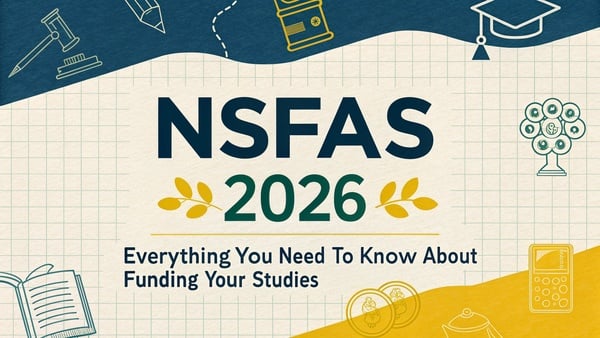
NSFAS 2026: Your Complete Guide to Funding Your Studies in South Africa
The National Student Financial Aid Scheme (NSFAS) continues to transform lives by providing critical financial support to students at public universities and TVET colleges. As we approach the 2026 academic year, this updated guide breaks down everything you need to know – from eligibility rules to application tips – to secure your educational funding.
Key Updates for NSFAS 2026
1. Expanded Funding Opportunities
The South African government has committed R51 billion to NSFAS for 2026, with plans for budget increases through 2027. This expanded funding means:
- More comprehensive support for students from households earning under R350,000 annually
- New income-contingent loan options for middle-income families (R350k-R600k household income)
- Enhanced disability support programs
2. Streamlined Digital Systems
NSFAS has launched upgraded digital platforms featuring:
- Faster application processing (average response time reduced by 30%)
- Direct allowance payments to student bank accounts
- Real-time application tracking through the myNSFAS portal
Critical Application Timeline
| Institution Type | Opening Date | Closing Date |
|---|---|---|
| Universities | 1 September 2025 | 31 January 2026 |
| TVET Colleges (Multiple Intakes) |
|
|
Eligibility Requirements
To qualify for NSFAS 2026 funding, applicants must meet these criteria:
- South African citizenship or permanent residency status
- Registration at an accredited public university or TVET college
- Annual household income below R350,000 (R600,000 for students with disabilities)
- First-time undergraduate qualification seeker
Required Documentation Checklist
- Certified ID copies (applicant and parents/guardians)
- Recent payslips/IRP5 forms OR sworn affidavit for unemployed guardians
- Completed and signed consent form (available on NSFAS portal)
- Valid contact information (email and mobile number)
Comprehensive Funding Coverage
For University Students
- Full tuition and registration fees
- Accommodation costs (up to R45,000 annually)
- Learning material allowance (R5,200 per year)
- Monthly living stipend (R1,650)
For TVET College Students
- Full course registration fees
- Transport allowance (R7,000 annually)
- Workshop/practical training support
- Incidental allowance (R3,045 per year)
Step-by-Step Application Process
- Create your profile at www.nsfas.org.za
- Complete the online application form with accurate personal details
- Upload certified supporting documents in PDF format (max 5MB per file)
- Submit your application before the deadline
- Use your unique reference number to track progress weekly
Pro Tips for Successful Applications
- Early Applications: 78% of on-time applicants receive feedback within 4 weeks vs 53% of last-minute submissions
- Document Quality: Ensure all PDF scans are clear and legible
- Communication: Check your registered email and SMS daily for updates
- Backup Support: Connect with your institution’s financial aid office for local assistance
Troubleshooting Common Issues
Problem: Application stuck in “Verification” status
Solution: Submit a service ticket through the myNSFAS portal with your reference number
Problem: Missing payment notifications
Solution: Confirm your banking details in the portal and allow 5-7 working days for processing
Final Checklist Before Submission
- Verified all personal information matches ID documents
- Confirmed household income figures with supporting evidence
- Tested portal login credentials
- Saved printed copy of submission confirmation
NSFAS 2026 represents a significant opportunity for South African students to access quality education regardless of financial background. By following this guide and staying informed through official channels (website: NSFAS, social media: @NSFAS), you can navigate the application process with confidence.
Was this helpful?
13 / 1
#Documents #Education #Learning #Universities